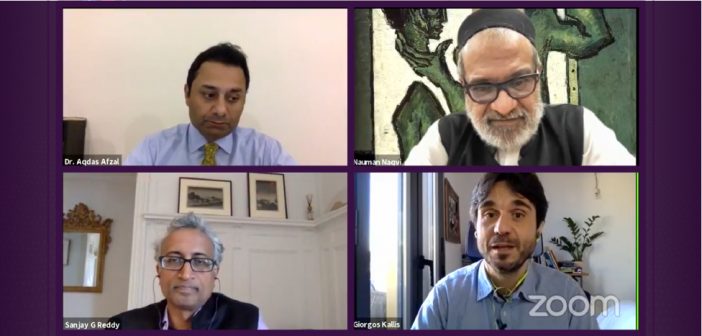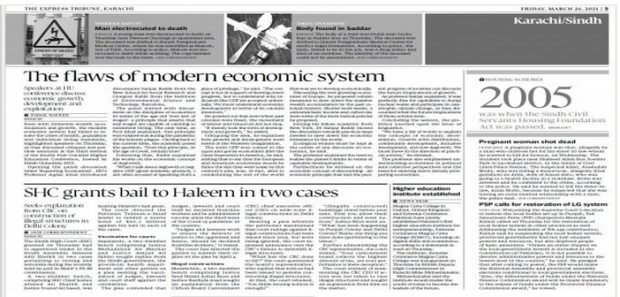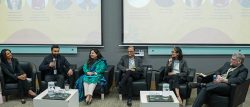In a world that operates on the prospect of growth-based economic development, an argument for ‘degrowth’ has been proposed as a pathway to sustainable living on this planet, avoid climate disasters and ensure the survival of low-income countries.
Concerns such as these were put forward in the session on “Repairing Economies” session during Habib University’s fourth Post-colonial Higher Education Conference. The central theme of the conference was “Decolonial Thought in the Global Ruins”. It featured Dr. Nauman Naqvi, Associate Professor of Comparative Humanities and chair of the conference, while it was moderated by Dr. Aqdas Afzal, Assistant Professor and Director of the Social Development and Policy Program.
The esteemed panel of guests included Dr. Georgios Kallis, Professor at the Institute of Environmental Science and Technology, and Dr. Sanjay Reddy, Associate Professor of Economics at the New School for Social Research.
Dr. Kallis, who has authored “The Case for Degrowth”, put forward the idea of how growth and economic development is actually linked to colonialism. He narrated the history of ‘degrowth’ in the context of post-development and how the standard models of growth-based development were essentially western-inspired. Scholars who discovered this had argued that the colonizing process continued in the guise of development projects and that the West ultimately exported this model to the rest of the world. Through it, the US and Europe controlled what they wished to control: a flow of natural and human resources to economies, low price of labor, and low prices of natural resources.
He went on to explain that critiques of growth say that they have a link to the process of colonization. This sort of ‘imaginary capitalism’ began with early capitalism in 18th century England and was exported to the rest of the world. The universe allows GDP growth-based economic development and there are very few alternatives to this, not to mention, very few voices to question the model itself.
It is a colonizing imagination, he argued. This process from the very beginning has been integrated with the process of colonization from those who wish to show us the good side of economic growth and capitalism.
Dr. Kallis explained that in the long-term, the entire process of economic growth that brought goods with it and elevated living standards, had a huge ecological and human cost: it was tied to human exploitation, such as slave labor and gender-based exploitation, especially of the unpaid work of women in households without which economic growth would not have taken off as it has.
He put forward the analysis that the call of growth is an effort to decolonize the imaginary – to decolonize the dominant idea of the future of economic growth. The prevailing critique is that colonization is not just an idea but a political and material process that is inflicted on the bodies of people and home nations. In this sense, Dr. Kallis refers to degrowth as a decolonizing proposal.
Watch the session
In the material sense, there has to be an end to the continuous exploitation of cheap resources and cheap human labor for the benefit of the global north. Dr. Kallis believes that any future that involves a compound economic growth in the global north means climate disaster.
“The unwillingness of the worst to slow down is the continuation of a brutal colonization process,” he remarked. The US is an example of this as it continues to appropriate a bigger and bigger part of the global atmosphere. It is shifting the course and continuing to live at the expense of the world at an unprecedented scale. He argued that we need to be thinking about the part of the world that is responsible for the colonizing project and to bring about decolonization.
He put forward the idea of living a dignified and ethical life. Slowing the growth of the global north and managing without growth is linked to reparative economies. He concluded that the very fact that the alternative is impossible is an invitation for us to think hard about how can we make degrowth a reality.
Dr. Sanjay Reddy highlighted how the question of the planetary limits of the economy is largely ignored. The few economic theorists who thought about this question 50 years ago were also sidelined. However, time has proven them to be extremely prescient that there are planetary limits and even with the extraordinary inventive powers of the capitalist economic systems, we may have been reaching some very significant boundaries.
He argued that the energy intensity of GDP in the world as a whole, the amount of energy used to produce a unit of GDP, has been falling quite dramatically due to improved technologies that use less energy in various domains because of a structural shift towards services and away from manufacturing.
That being said, it is not enough that energy intensity must fall if you have an ever-multiplying number of GDP units which could cause net resource demands to increase in multiple sectors.
Dr. Reddy pointed out that Organization for Economic Co-operation and Development (OECD) countries have lower energy use than non-OECD use as long as there was some clean development mechanism that allowed the transfer of resources and technologies to produce cleaner units of GDP from rich countries to poorer countries. “We haven’t had much of that,” he remarked.
On protecting the interests of future generations, he said that the answer of a conventional economist would be to ask what level of welfare are people in the future likely to have. The discounting mechanism that has made a person’s worth less than the welfare of the present might strike a number of laypeople and reveal that it is not a very obvious thing to do as parents do not treat their children’s worth less than their own. However, this is what the framework is demanding. The problem, he explains, is this approach is entirely blind to the kind of concerns of obligations or responsibility which reparative futures perfectly takes the name for. Dr. Kallis’ work similarly emphasizes the need to move beyond the narrow utilitarian view of society.
He explained how, if we do not fetishize per capita income, we have to see and understand what exactly has been going on in Bangladesh and Pakistan. Bangladesh was a social development success before it became an economic success. This suggests that there may be a causal running in the opposite direction from social development with improvements in women’s health and education and per capita income. All of this, however, needs to be studied. It is difficult to imagine putting an analysis of GDP to per capita income on one side or including it as an objective in a balanced point of view.
Growth is a salve for distributional conflict, it is an outlet, he highlighted, noting that there is a desire on the part of some to have more than is attainable without taking away resources from others. This is growth. That is, in theory, as long as we’re thinking of the question arithmetically. But growth in practice does not happen in this arithmetic way – more for some and less for others, sometimes it is less for others in what is called mal-growth. Improvement, he argues, is betterment.
Dr. Reddy questioned our obsession with growth regardless of the cost it entails. In every country of the world today, zero growth along the current pattern would spell social and economic crisis because it would mean increased levels of unemployment. We demand and need or require growth on the existing pattern of how economies operate simply to stay still for unemployment. Reparative futures, he concludes, is a call to reimagine and avoid making the mistakes of the past.
News Coverage
The Express Tribune





